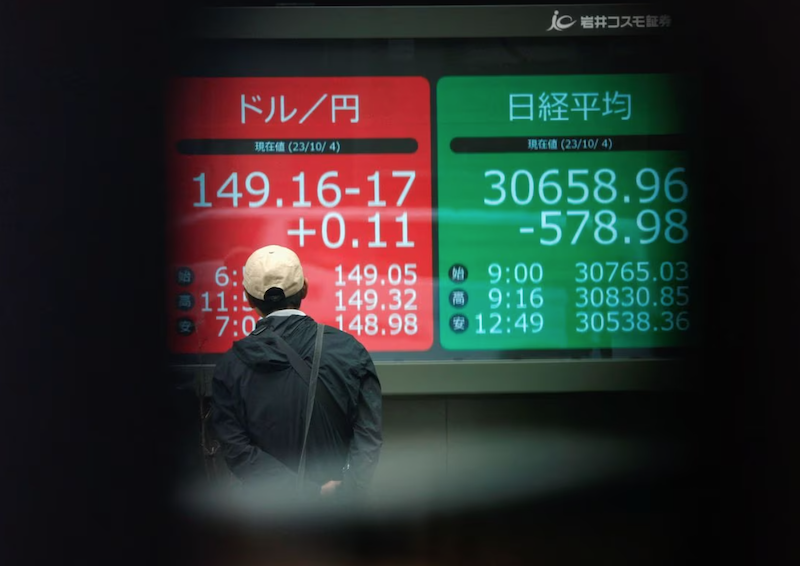Markets across Asia were in for another day of mixed moves as fears of a fresh round of trade conflict punctured optimism around slowing US inflation and somewhat comforting Fed signals.
Bond market borrowing costs and the dollar rose after the Fed nudged back rate cut expectations, but Wednesday’s softer-than-expected US CPI figure helped cool sovereign yields.
The Fed shift “could have been big,” AXA’s Chief Economist Gilles Moec said. “But I think it was drowned out by the US inflation data we had. So the data beat the Fed guidance.”
Also on AF: Turn Away From EV Tariffs, China Tells European Commission
On the EV tariffs, he said that the EU was at least taking a more targeted company-by-company approach rather than the kind of blanket measures seen from the United States.
“And protectionism is something that got quite a bit of traction during the EU elections campaigns,” he added.
Even so, world stocks retreated from record highs as China signalled it would respond to the EU’s tariffs on its electric vehicle makers.
Stocks on the mainland remained muted even though investors shrugged off EU’s extra duties of up to 38.1%. The punitive duties reminded investors of the growing trade tensions between China and the West, and cast a cloud over Chinese exports.
At the close, the Shanghai Composite index was down 0.28% at 3,028.92, while the blue-chip CSI300 index pared early gains to close down 0.51%.
Major Chinese electric car makers including BYD, Li Auto and Geely Auto all rebounded, although other brands dipped.
Meanwhile, Hong Kong shares gained after US and world stocks touched record highs overnight.
The Hang Seng index was up 174.79 points or 0.97% at 18,112.63. The Hang Seng China Enterprises index rose 0.98% to 6,421.81.
EV-maker BYD was among the top gainers on the Hang Seng, closing with gains of 5.82%.
BoJ policy meet weighs on Nikkei
In Japan, the Nikkei share average reversed early gains amid caution around the Bank of Japan’s policy decision due on Friday.
The index closed 0.4% lower at 38,720.47, after rising nearly 1% to cross the 39,000 level earlier in the session as chip-related stocks tracked their US peers.
The broader Topix also gave up early gains, ending 0.89% lower at 2,731.78.
The BOJ will conclude its two-day policy meeting on Friday, where it is expected to keep interest rates steady and consider whether to offer a clearer guidance on how it plans to reduce its huge balance sheet.
“The market has already taken into account that the BOJ will reduce the bond buying amounts, so the market reaction after the policy meeting is expected to be limited,” Daiwa’s Hosoi said.
The BOJ will consider trimming its bond buying at the meeting ending on Friday, the Nikkei newspaper reported, taking a first key step to reducing its almost $5 trillion balance sheet.
MSCI’s index of Asia-Pacific shares outside Japan climbed 0.6% though as Taiwan’s tech-heavy stock market surged 1.8% to a new high, buoyed by the overnight rally on Wall Street.
Elsewhere across Asia, Bangkok, Jakarta and Manila slumped, while Singapore, Korea and Mumbai edged up.
Bears lock in on Asian currencies
With US rate cuts remaining elusive, a resilient dollar is likely to continue to hurt Asian currencies, a Reuters poll showed on Thursday.
The Indonesian rupiah and the Philippine peso were the most shorted currencies in the region, with bearish bets on both at multi-week highs, a fortnightly poll of 10 analysts showed.
“We still see upside risks for the DXY (dollar index) given that we remain in an uncertain transitory period on (US) inflation and markets may continue to be cautious,” analysts at Maybank said in a note on Thursday.
The Indonesian rupiah, one of the worst-performing currencies in the region so far this year, has seen analysts build up their short bets throughout the year as external factors and corporate dividend outflows pressure the currency.
Meanwhile, analysts have also turned bearish on the Indian rupee, one of the top-performing currencies in the region so far this year, as external factors like high interest rates and Middle East geopolitical tensions put pressure on the currency.
Bearish views also ticked higher on the South Korean won, the Taiwan dollar, and the Singapore dollar, while being trimmed marginally on the Chinese yuan and the Thai baht.
Key figures:
Tokyo – Nikkei 225 < DOWN 0.40% at 38,720.47 (close)
Hong Kong – Hang Seng Index > UP 0.97% at 18,112.63 (close)
Shanghai – Composite < DOWN 0.28% at 3,028.92 (close)
London – FTSE 100 < DOWN 0.45% at 8,178.55 (1114 GMT)
New York – Dow < DOWN 0.09% at 38,712.21 (Wednesday close)
- Reuters, with additional editing by Vishakha Saxena
Also read:
Hong Kong, UAE Firms Hit With Sanctions for Russian Gold Deals
China Solar Panel Makers Want Beijing to Stop ‘Over-Investment’
Chinese EV-Makers Face New Tariffs of up to 38%, EC Says
China Firms ‘Face More US Sanctions for Goods Going to Russia’
























